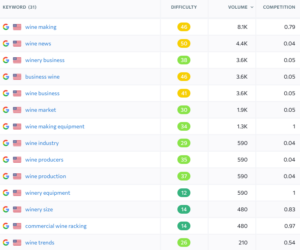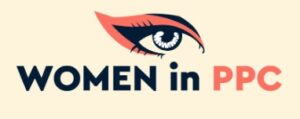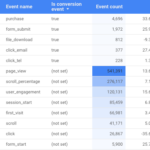We have co-located an office in Fredericksburg, the heart of the Texas Hill Country to be closer to the award-winning wine industry in Texas. As the wine and beverage industry here continues growing, we see the challenges that business-to-business and industrial suppliers are having in reaching the very relationship based community of winemakers. Online marketing is very near table stakes to establish trust and visibility in what is sometimes an urgent need for information by vineyards and wineries.
The b2b digital marketing for wine industry has become an essential aspect of business growth and sustainability in recent years. Trying to reach winemakers, grape growers, and other beverage professionals? Marketers will need to remain up-to-date and apply successful plans that are designed specifically for this specialized market.
In this blog post, we will dive into some key challenges faced by professionals in the b2b wine and beverage industry and explore practical solutions to overcome them. We will discuss how SEO and paid advertising can be tailored to suit the unique needs of the wine sector, as well as share insights on content creation that resonate with your target audience.
We also get a chance to examine how leveraging technology and integrated eCommerce solutions can streamline processes while providing a personalized experience for customers. By implementing these tactics, you’ll be better equipped to drive success in today’s competitive wine and beverage market.
Table of Contents:
- Challenges in B2B Wine Industry Marketing
- Identifying the Right Channels for Communication
- Building Trust Among Wine Makers
- SEO and Paid Advertising Strategies
- Content Creation & Social Media Management
- Leveraging Technology & Integrated eCommerce Solutions
- Conclusion
Challenges in B2B Wine Industry Marketing
The wine industry faces unique challenges when it comes to B2B marketing, including reaching the target audience of winemakers and producers. Equipment suppliers and service providers must overcome these obstacles to effectively connect with their potential customers. In this section, we will explore the challenges that wine businesses face and strategies for overcoming them to effectively reach their target audience.
Identifying the Right Channels for Marketing Communication
Discovering proper methods to communicate with one’s desired demographic is fundamental for any business’s prosperity. The wine industry is no exception; however, identifying suitable platforms can be particularly challenging due to its niche nature. Traditional methods such as trade shows or print advertisements may not yield desired results in today’s digital landscape.
To address this issue, companies should consider investing time and resources into researching online communities where winemakers congregate. This could include industry-specific forums, social media groups focused on winemaking topics, or even popular blogs that cater specifically to professionals within this field.
- LinkedIn: Joining relevant LinkedIn groups can provide valuable networking opportunities while also allowing you to share content related directly to your products/services.
- Facebook: Participating in Facebook groups dedicated exclusively towards winemaking discussions allows you access a highly engaged community eager for new information/ideas about equipment/supplies they require daily basis.
- Blogs & Online Publications: Contributing guest articles or partnering with well-known bloggers/publications offers an excellent opportunity showcase expertise while simultaneously reaching broader audiences who might otherwise remain unaware offerings exist at all.
Building Trust Among Wine MAkers
Establishing trust with potential clients is essential in any industry, but it can be particularly challenging for B2B wine equipment suppliers and service providers. Winemakers are often wary of new vendors due to concerns about product quality or reliability.
To overcome this hurdle, businesses should focus on building credibility:
- Customer Testimonials: Sharing positive feedback from satisfied customers demonstrates your commitment to delivering high-quality products/services while also providing social proof that others have had success working alongside you.
- Certifications & Accreditations: Obtaining relevant certifications/accreditations (such as ISO standards) showcases dedication towards maintaining industry best practices; thus, instilling confidence among prospective clients who may view these credentials favorably when evaluating potential partners/vendors alike.
- Educational Content: Providing informative content such as blog posts, whitepapers, podcasts interviews, or webinars positions your company as an expert within the field – a valuable resource winemakers can rely upon whenever they require assistance/guidance regarding their own operations/processes moving forward into future endeavors together.
Incorporating these strategies into your marketing efforts will help address some of the unique challenges faced by B2B wine equipment suppliers and service providers. By identifying effective communication channels and establishing trust with your target audience, you’ll be well on your way towards forging lasting relationships within this specialized sector.
Cultivating your own digital space on your website is one of the best investments in a long-term strategy. To build authority and trust and move past some of the noise, you will need to understand and utilize effective SEO and paid advertising strategies. By leveraging keyword research tailored to the wine industry as well as placing ads on relevant platforms, businesses can better reach their target audiences and build trust among merchants.
SEO and Paid Advertising Strategies
Implementing a digital marketing strategy focused on both SEO and paid advertising can provide numerous benefits for equipment suppliers and services companies in the wine industry. These strategies lay a strong foundation for increasing leads, and provide a baseline for understanding the cost of acquiring new leads within this niche market.
Keyphrase Research Tailored to the Wine Industry
To create an effective SEO strategy, it’s essential to conduct topic and keyphrase research tailored specifically to the wine industry. By identifying relevant keywords that winemakers and producers are likely searching for, you can optimize your website content to rank higher in search engine results pages (SERPs). This will help drive organic traffic from potential customers who are actively seeking information about products or services like yours.
- Analyze competitor websites for keyword gaps to develop a SEO driven Content Workbook
- Use tools such as Google Keyword Planner or SEMrush to identify high-volume, low-competition keywords related to your offerings
- Use the Content Workbook to create engaging articles, videos, and repurposed social media around these targeted topics that provides value to readers. The bonus here is it can elevate your position online while showcasing your expertise in the field of wine production equipment and services.

Effective Ad Placements on Relevant Platforms
Paid advertising is another component of a successful B2B digital marketing plan for the wine industry. By investing in targeted ad placements across various platforms such as Google Ads, LinkedIn Ads, or specialized trade publications like, you can reach decision-makers who may be interested in purchasing your products or services. To maximize ROI from these campaigns:
- Understand your online competition and ideal client profile and where they look for information on products and services.
- Determine which platforms best align with your target audience’s preferences and behaviors.
- Utilize ad targeting options to ensure your ads are displayed to the most relevant users.
- Monitor campaign performance regularly, making adjustments as needed to optimize results.
By combining a well-researched SEO strategy with targeted paid advertising campaigns, wine equipment suppliers and service providers can effectively reach their desired B2B audience while increasing leads and driving business growth.
SEO and Paid Advertising Strategies are essential for any business looking to reach the wine industry, but they must be implemented strategically. To further maximize visibility in this space, content creation and social media management should also be considered.
Content Creation & Social Media Management
In the B2B wine industry, engaging content creation and effective social media management are helpful for nurturing relationships between vendors and clients. By providing educational content that meets the needs of busy winemakers, businesses can better connect with their target audience and generate more leads.
Utilizing a Content Calendar for Consistent Messaging
A well-structured content calendar is essential to ensure consistent messaging across all marketing channels. Organizing material ahead of time, like blog entries, articles, recordings, webinars, digital broadcasts or any other applicable substance for your intended interest group can help guarantee reliable messaging across all marketing channels.
Reactionary and sporadic content can reduce the impact of valuable information. Maintaining a consistent stream of interesting and useful content can help to both build trust, build brand recognition with potential customers and enhance search engine visibility through regular updates.
- Create an editorial plan outlining researched topics related to wine equipment and services.
- Schedule publication dates ahead of time based on seasonal trends or industry events.
- Maintain flexibility within your calendar for last-minute changes or breaking news stories relevant to your niche market.
High-Quality Video Production Showcasing Products/Services
The use of high-quality video production has proven particularly popular among B2B audiences in the wine sector. Videos allow companies to showcase their products/services in action while demonstrating their unique value proposition compared to competitors. To create compelling video content:
- Familiarize yourself with current trends in video production by researching successful examples from other industries as well as staying up-to-date on best practices shared by experts like those at Vimeo.
- Invest in professional equipment or hire a skilled videographer to ensure your videos are visually appealing and effectively convey your message.
- Have a plan to utilize both long-form and short-form content to be shared on b2b platforms.
- Formulate a plan of action which encompasses both organic and paid marketing on social media networks like YouTube, Facebook, LinkedIn, and Instagram.
By implementing these content creation and demand generation strategies as part of the WHO Digital Strategy for B2B wine industry, businesses can better reach their target audience of winemakers and producers while increasing leads.
Leveraging Technology & Integrated eCommerce Solutions
Adopting innovative technologies such as online advertising, email marketing, social media advertising, and integrated eCommerce solutions helps businesses in the wine industry identify their customer base more deeply while providing fast and easy tools designed to keep clients engaged and happy. In this section, we will discuss how personalized communications using existing data/images can enhance your digital marketing efforts and streamline processes through advanced software.
Personalized Communications Using Existing Data/Images
Tapping in to the behavior collected by automated marketing or eCommerce tools will provide rich data for your marketing team. By leveraging existing data on customer preferences, purchase history, browsing behavior, etc., you can craft targeted messages that resonate with your audience. Additionally, incorporating high-quality images of products/services into these communications not only adds visual appeal but also allows potential buyers to better understand what they are purchasing.
- Email Marketing: Utilize segmentation strategies based on user behavior or preferences when sending out newsletters or promotional offers.
- Social Media Advertising: Create tailored ad campaigns targeting specific demographics within the winemaking community by analyzing user engagement patterns across various platforms.
- eCommerce Personalization: Implement product recommendations based on past purchases or items viewed by users visiting your website/storefront.
Streamlined Processes Through Advanced Software
Software solutions of an advanced nature can assist wine businesses in automating multiple facets of their operations, from inventory control to order processing, reducing the need for manual labor and improving productivity. By integrating these tools into your digital marketing strategy, you can streamline various processes while ensuring a seamless experience for customers.
- Inventory Management: Implement software solutions which allow you to track inventory levels in real-time and automatically update product availability on your website/eCommerce platform.
- Order Processing & Fulfillment: Utilize platforms which automate order processing, shipping calculations, tax compliance, etc., ensuring accurate and timely deliveries for clients.
- Data Analytics & Reporting: Leverage data-driven insights from tools like Google Analytics and custom dashboards from Google’s Looker Studio to optimize marketing campaigns based on user behavior patterns and conversion rates across different channels/platforms.
Incorporating advanced technology solutions into your B2B wine industry digital marketing strategy not only helps create personalized experiences but also streamlines internal processes – ultimately leading to increased customer satisfaction and business growth.
Reach Wine Makers and Retailers with B2B Digital Marketing
By utilizing effective tools and tactics such as SEO, Paid Advertising, Content Creation & Social Media Management, along with Technology & Integrated eCommerce Solutions, you can develop a bespoke approach to ensure your business remains competitive and that your message reaches its target audience.
Reach out to WHO Digital Strategy to learn how our experience in industrial, commercial and online marketing increase sales for our clients.







